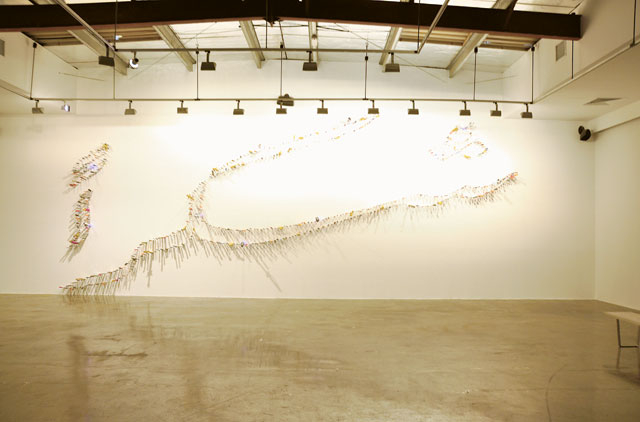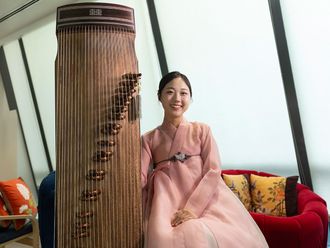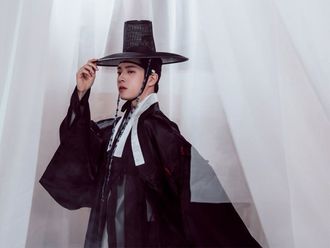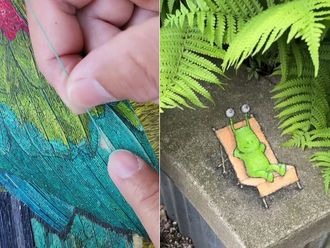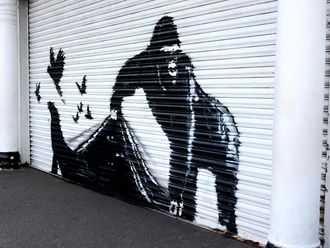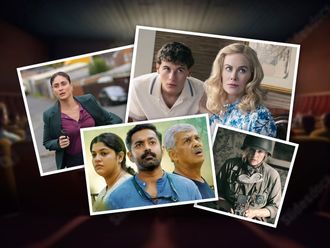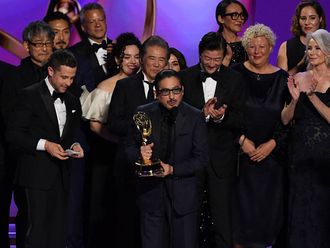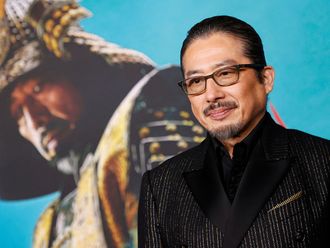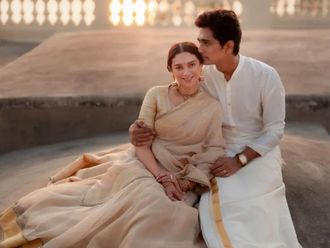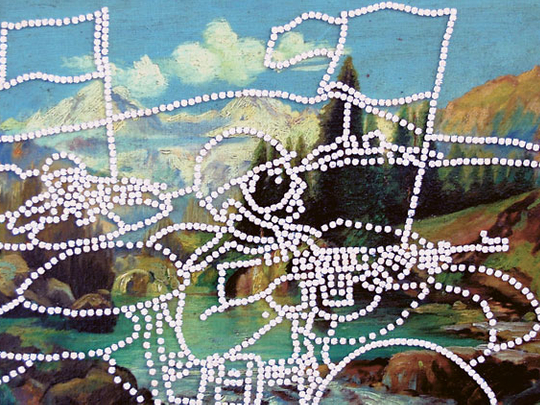
Farhad Moshiri is witty, irreverent and incisive. His work combines traditional Iranian elements with popular culture to comment on modern Iranian society and various socio-political issues.
The Tehran-based artist studied art and filmmaking in the United States. He burst on to the international art scene with his acclaimed jar series. In these paintings, he subtly highlights the complexity of maintaining traditional values in a modern society by carefully recreating the texture of antique jars unearthed from archaeological sites in Iran and then covering them with pop lyrics written in the ancient Abdjad numerical script.
Since then, Moshiri has experimented with a variety of materials, such as Swarovski crystals and cake icing cones, to create a unique artistic vocabulary.
His use of everyday materials in an unusual context challenges pre-conceived notions about them and forces viewers to look at the materials and the message with a new perspective.
His third solo exhibition in Dubai, Shukran, again demonstrates Moshiri's ability to examine complex social situations with simplicity and humour. The single, larger-than-life installation, created directly on the gallery wall, consists of 800 knives with handles of different colours, shapes and sizes spelling out shukran, the Arabic word for "thank you".
As always, his message and choice of material is ironic, tongue-in-cheek and open to various interpretations. But the artist does have a lot to thank Dubai for. It was at an auction here that he became the first Iranian artist to achieve the $1 million (Dh3.67 million) mark.
This was for Eshgh, an embroidered work featuring the Persian word for "love" embellished with Swarovski crystals and glitter. And the city is now hosting the first solo retrospective of his work, titled Love is Not Everything.
Weekend Review caught up with Moshiri on his recent visit to Dubai for the two exhibitions. In between sticking knives into the wall, the artist spoke to us about art and life. Excerpts:
What is the concept behind ‘Shukran'?
In a nutshell, sometimes just a simple thank you is enough. Of course, the piece is ironic and not so straight-forward but there is, nonetheless, the element of thank you. It could be — thank you with a question mark or just thanks. But the idea is to try to create a gesture, a word or an object that everyone can quickly connect with on a primal level and not in a complicated, elitist, arrogant, intellectual or ambiguous level.
What is the idea behind using unusual materials in your work?
For me art is about figuring out a new and powerful language to express my ideas; and also about simplifying my work such that everybody can understand this bizarre language and enjoy it.
Taking yourself too seriously does not help creativity, so I tend to humour myself and ask the viewer to humour me.
When I switched from my jar and numeral paintings, which had quite a powerful impact, a lot of people were really disappointed with my experiments with these materials. It is difficult when you make that leap from something that is popular to something that involves starting from scratch.
But as an artist you have to be persistent to be taken seriously. You have got to make your point, insist on being heard and not give up. I stuck in there through those disappointing situations and then suddenly people started "getting" what I wanted to say.
Have you completely stopped doing the jar paintings?
I just cannot do them any more. Once the auction phenomenon started, it was just not cool to keep doing them and selling more and more jars. But that work has its own life and keeps coming back at various auctions. It is almost like a recurring nightmare. But I am happy that people like them. Whether they are good or bad, artworks have their own destinies — some die quickly and some get stronger.
How did it feel to become the first Middle Eastern artist to have your artwork sold for over $1 million at an auction?
Auctions have become an indispensable backbone of the art market, so somehow we must cope with the phenomenon. I was dumbfounded by that record-breaking sale and went through cycles of euphoria and worry about living up to expectations in the future.
So much has changed since then that the moment has become a strong point in my life. But there is no room for complacency — because I know that the hype does not last and that people are intelligent enough to not be influenced by the hype.
How do you feel about the first retrospective of your work?
Well, it does not feel bad. I like the way the show has been put together. It is not about me bashing America or social situations or global phenomena. It is a very personal exhibition, almost like a self-portrait. It is nice to have my first retrospective in Dubai, because it is a young, dynamic place with wonderful energy. Dubai has been good to me and I want to say thank you.
You have done many interesting ‘self-portraits', including some in which your image cannot be seen. What is your concept of a self-portrait?
The concept of a self-portrait is fascinating because anything you do is essentially a reflection of you and hence a self-portrait. So if I have a pile of 40 carpets that look like Tom and Jerry have crashed through them, I feel the label of self-portrait kind of explains the idea and keeps the message focused, thus making it easier to understand.
Does being married to an artist help?
Shirin [Aliabadi] is an incredible filter of bad ideas. I am blessed to have her as a sounding board and she is blessed too, because I also have some good ideas, you know. Sometimes we cannot agree whose idea it originally was and get into a fight over it and then we call the project a collaboration.
Can art be a means of political protest, especially with the present political situation in the region?
I avoid topical issues because they quickly become old news and may not be so relevant a week later. I don't protest but sometimes the fact that I don't go there makes a lot of noise and my work has often evoked strong reactions for what it is not about.
Shukran will run at The Third Line until April 21. Love is Not Everything will run at the Farjam Collection, DIFC, until June 30.


